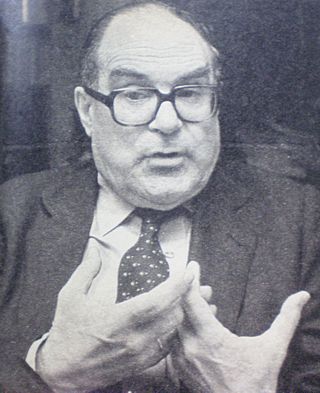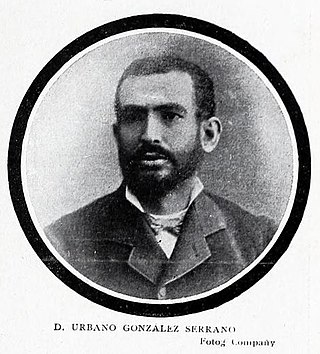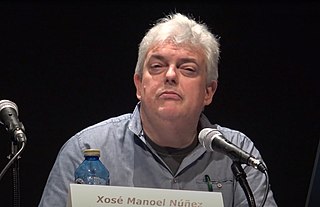
Marcelino Menéndez y Pelayo was a Spanish scholar, historian and literary critic. Even though his main interest was the history of ideas, and Hispanic philology in general, he also cultivated poetry, translation and philosophy. He was nominated for the Nobel Prize in Literature five times.

Almodóvar del Campo is a municipality of Spain, located in the province of Ciudad Real, autonomous community of Castilla–La Mancha. Featuring a total area of 1.208,25 km2, it is the largest municipality in the region and one of the largest municipalities in Spain. As of 1 January 2020, it had a population of 5,983.

Julián Marías Aguilera was a Spanish philosopher associated with the Generation of '36 movement. He was a pupil of the Spanish philosopher José Ortega y Gasset and member of the Madrid School.

Urbano González Serrano was a Spanish philosopher, sociologist, psychologist, pedagogue, literary critic, and politician. Juan Antonio Garcia posited González was the principal developer of krausoposivitismo, a mixture of positivism and Krausism. These beliefs were determined by Yvan Lissorgues as an amalgamation of "abstract idealism of the Hegelian type and extrapolations of some philosophers and scientists".

Martín Almagro Gorbea is a Spanish prehistorian.
Antonio Domínguez Ortiz was a Spanish historian, one of the leading specialists in the history of the Spanish Antiguo Régimen of the 16th through 18th centuries, in particular in social history. He was also expert historian of Andalusia, with a particular emphasis on the history of the Moriscos.

Emiliano Aguirre Enríquez was a Spanish paleontologist, known for his works at archaeological site of Atapuerca, whose excavations he directed from 1978 until his retirement in 1990. He received the Prince of Asturias Award in 1997.

Margarita Salas Falgueras, 1st Marchioness of Canero was a Spanish scientist, medical researcher, and author in the fields of biochemistry and molecular genetics.

Julio Rey Pastor was a Spanish mathematician and historian of science.
Ana María Vázquez Hoys is a Spanish ancient history professor and book author. She collaborates in educational radio and television programs and gives talks at conferences on Ancient History. She studied at the Universidad Complutense de Madrid before becoming a teacher at the Universidad Nacional de Educación a Distancia in Madrid, Spain.

The Battle of Bayona Islands, also known as the Battle of Bayona Bay, was a naval engagement that took place in early 1590, off Bayona Islands, near Bayona and Vigo, Spain, between a small Spanish naval force commanded by Captain Don Pedro de Zubiaur, and an Anglo-Dutch flotilla of 14 ships, during the Eighty Years' War, and in the context of the Anglo-Spanish War (1585–1604) and the French Wars of Religion. After several hours of hard combat, the Spanish naval force composed of three flyboats achieved a great success, and the Anglo-Dutch fleet was totally defeated. The flagship of the Dutch was boarded and captured, including another six ships more. Finally, the rest of the Dutch fleet was forced to surrender. Shortly after, Pedro de Zubiaur arriving at Ferrol, along with the captured ships, with great surprise for the Spanish authorities of the port.
Margarita Salaverría Galárraga was Spain's first woman diplomat.
Margarita M. Birriel Salcedo is a tenured professor in the Department of Modern and American History at the Faculty of Philosophy and Letters of the University of Granada. She is an expert in women's history and women's studies.

Rosa Cobo Bedía is a Spanish feminist, writer, and professor of sociology of gender at the University of A Coruña. She is also the director of the Center for Gender Studies and Feminists at the same university. Her main line of research is feminist theory and the sociology of gender.

José Félix Tezanos Tortajada is a Spanish sociologist, politician, and professor. He serves as President of the Centro de Investigaciones Sociológicas (CIS) since 2018.
Jenara Vicenta Arnal Yarza, was the first woman to hold a Ph.D. in chemistry in Spain. She was noted for her work in electrochemistry and her research into the formation of fluorine from potassium biflouride. In later years, she was recognized for her contribution to the pedagogy of teaching science on the elementary and secondary levels, with a focus on the practical uses of chemistry in daily life. She was awarded a national honor, the Orden Civil de Alfonso X el Sabio.

Xosé Manoel Núñez Seixas is a Spanish historian who specializes in nationalism studies, the cultural history of war and violence, and migration studies.

Miguel Colmeiro y Penido was a Spanish botanist, and member of the Spanish Royal Academy of Sciences.

Virginia Tovar Martín (1929–2013) was a Spanish art historian, author, and professor. She was a foremost scholar in the study of architecture and urban planning of Madrid during the Baroque period. Tovar Martín was a Professor of History of Art at the Complutense University of Madrid; and at Autonomous University of Madrid.

Mirta Núñez Díaz-Balart is a Cuban-Spanish historian.















